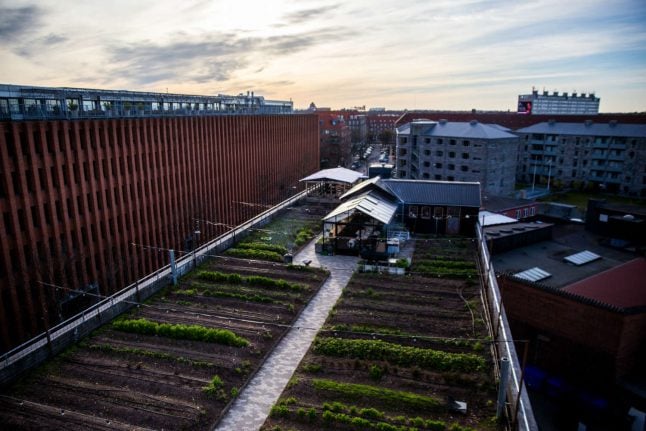Historical legislation, the 1975 Byggeloven (Building Law), designates the Copenhagen roof a location for parking to serve users of the building, which once housed a car auctioneer company. But the parking spaces may never be used in practice.
ØsterGro was started in 2014 by three idealist young people: Kristian Skaarup, Livia Urban Swart Haaland and Sofie Brincker, who were inspired by the famous Brooklyn Grange Farm in New York.
With 20,000 visitors a year, the unique ØsterGro has been featured in high-profile travel magazines and newspaper articles, while C40 Cities, an organisation which promotes sustainable solutions in cities, was planning to use the farm as a meeting location.
The urban farm now faces the prospect of moving 100 tonnes of soil, all their current crops, the greenhouse, which is the location of its restaurant Gro Spiseri, ten hens, three families of bees and two rabbits.
A final decision is expected before Christmas, but the farm's founders have not yet given up the fight.
“We are not going anywhere at the moment! We are keeping the fight going and we are currently at a deadlock. We see this as a David and Goliath battle with the kommune [municipality, ed.] trying the squeeze the little people. Perhaps it is time that we reach state level to change this legislation,” Skaarup told The Local.
“If ØsterGro is removed, there will be no winners in this,” he added.
Jac Nellemann, who owns the building, has previously said that the location might never actually be used as parking, given that it can only be reached by an old car lift left over from the days when the building was a car auction house.
“It's tough when the municipality itself has help set up the farm, only to come back four years later saying that we have to put cars on it,” Nellemann told newspaper Dagbladet Information.
Nellemann gave ØsterGro permission to start up on the roof in 2014, and is a supporter of the project. ØsterGro obtained a temporary licence to use the roof, but now the municipality will not extend the permit and wishes to revert the space to car parking.
The parking spaces will not be for the public but the users of the building.
Copenhagen Municipality’s urban planning committee (Teknik- og Miljøudvalget) gave Østergro and Nellemann the opportunity to identify alternative spaces nearby in which to accommodate the required 23 parking spaces, but this was not possible in such a densely populated urban area.
The municipality itself has given Østergro 350,000 kroner in funding, politicians have used the space for photographs in political campaigns, the farm is featured in Visit Copenhagen’s tourist guides, and it is an important element in the C40 Climate Quarter project, which focuses on solutions to adapt the city’s rain water management.
Given ØsterGro’s presence in the branding of Copenhagen as a green city, its destruction seems to be a paradox.
The rooftop farm is used for lectures, tours, and courses for schools on organic farming and agriculture. 40 local community members receive fresh vegetables from the farm. On Wednesdays, the farm opens for visitors to come and learn about the cultivation of the crops. Ten people are currently under its employment.
“My children can be part of seeing things grow all the way from the land to the table. And it gives a really good sense of what food is and renewed respect for it. I've learned how demanding it is to grow a head of cabbage head,” Nikola Kiørboe, a volunteer at the farm, told Dagbladet Information.
The only way the decision can be reversed appears to be a change to the forty-year-old legislation.
Ninna Hedeager Olsen, a councillor with the Red Green Alliance party and head of the municipality’s urban planning and environment committee (Teknik- og Miljøudvalget), expressed her regret at the situation.
“I think it's terrible. ØsterGro is an example of everything we want with the city: to create biodiversity, local food production, communities, a greener city,” Olsen told Dagbladet Information.
“All the politicians on the committee have asked the [municipal] administration, in 27 different ways, whether anything can be done. And the answer is that the law does not allow it. I think if there was an opportunity, the administration would have found it,” she added.
Contacted by The Local, a press officer with Copenhagen Municipality confirmed the accuracy of Dagbladet Information's report on the matter but asked not to be quoted directly.
Meanwhile, ØsterGro has started a petition against the closure, which currently stands at almost 6,000 signatures, and is scheduled to hold its Christmas market on December 15th-16th.
READ ALSO: Denmark's government to spend a billion on organic farming



 Please whitelist us to continue reading.
Please whitelist us to continue reading.